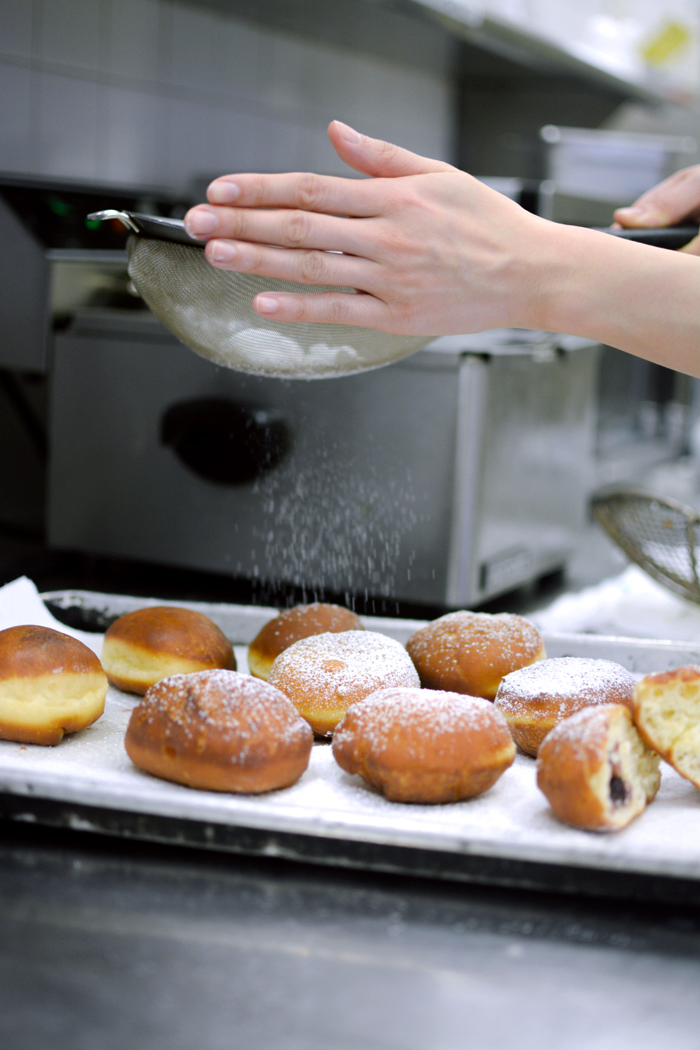When I first started at ICE nearly six months ago, I could barely contain my excitement at the prospect of everything I would learn in the weeks ahead. From mastering basic knife skills to preparing the perfect Lobster Americain, I was ready to go with guns blazing. However, as I sautéed, roasted and braised my way through modules one through three, I began to feel a creeping sense of unease as our class approached module four: the pastry module.
As many of my culinary-minded classmates could also tell you, baking and cooking are different beasts that require vastly different skills to master. Whereas cooking allows you to throw in a little of this and a pinch of that, baking mandates that you follow the recipe to a T or risk ending up with a disappointing mess. Needless to say, as someone who had always fallen squarely into the cooking camp, I was more than a little wary about the pastry module. However, six weeks later, with our final pastry exam just around the corner, I am proud to say that not only did this non-baker survive the dreaded pastry module, I even enjoyed it (for the most part). Here are a few critical lessons I’ve learned along the way.
As much as you want to, resist the urge to get creative with a recipe.
Unlike cooking, baking is first and foremost a science, so any tinkering with ingredients or measurements can throw off the precise formula of a recipe and ruin your final product. As someone who had grown used to viewing recipes more as guidelines rather than hard and fast rules, this was a lesson I had to learn the hard way. However, with my chef instructor’s urging — “Don’t get creative!”— I learned to stifle that little voice in my head that insisted on improvising and saw a marked improvement in the quality of my work.
Weigh out your ingredients for the most consistent results.
As an ardent eyeballer, weighing out every ingredient seemed incredibly tedious and unnecessary at first — I mean, how much can a few extra teaspoons of butter, flour or eggs really affect a recipe? However, after more flops than I’d like to admit, I realized just how important weighing is to measuring ingredients — cutting corners is out of the question.
While dry measuring cups are easy, they simply can’t provide the accuracy of a scale and can produce inconsistent results. For example, while I plunge a cup measure into flour until it overflows, someone else may carefully spoon the flour into the cup and level it off with a knife. Although technically we both added “a cup” of flour, our final products will be different due to the weight. Once again, this points back to baking as a science. It’s all about precision, precision, precision.
Learn to love (and develop) gluten.
Before starting the pastry module, all I knew about gluten were the evils that my gluten-free friends warned me about. As it turns out, gluten is truly amazing stuff. It’s a strong, sticky protein that forms when wheat flour and water mix, lending baked goods like waffles, pretzels and artisan breads structure and elasticity. However, developing just the right amount of gluten in a recipe is a tricky endeavor.
For example, in order to produce a chewy pizza crust, you want to knead the dough for several minutes to encourage gluten development. When making flaky pastries like pie crusts or biscuits, however, overworking the dough can produce too much gluten development, leaving tough, dense, rubbery results. As a dough-making novice, learning how to develop just the right amount of gluten was a matter of sticking to the recipe and developing a sense for how certain doughs should feel.
Using the right tools can make all the difference.
While cooking, you can usually make do with basic kitchen tools. With just a few good pots and pans, a pair of tongs and a spoon, you can whip up virtually anything. On the other hand, baking requires a more specialized set of tools.
I can’t imagine trying to smooth out buttercream frosting on top of a cake without an offset spatula, piping perfect meringue rosettes without a pastry bag or getting tempered chocolate to exactly the right temperature without a thermometer. While relying so heavily on specialty tools was new to me, it taught me the importance of reading recipes in advance so that I know just what baking tools I’ll need.




